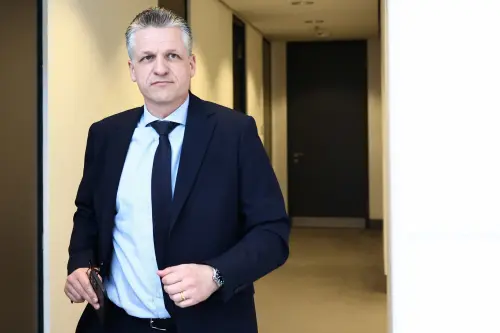Germany's likely next chancellor, Friedrich Merz, is racing against time to secure support for a significant increase in state borrowing. Optimistic remarks by party negotiators following emergency talks pushed the euro to a five-month high on Tuesday.
Merz must now persuade lawmakers in the outgoing parliament to approve plans to loosen Germany's strict borrowing limits in an effort to jumpstart its sluggish economy and inject hundreds of billions of euros into defense.
The Greens party, crucial for passing the measures, withheld their support and proposed their own plan on Monday night. However, co-leader Felix Banaszak hinted at ongoing negotiations, mentioning a week's timeframe to reach an agreement with Merz.
A senior lawmaker from Merz's conservative CDU/CSU bloc, Thorsten Frei, expressed optimism, stating, "Now we have a foundation on which we can move towards each other."
While a deal might not materialize this week, sources from Merz's conservative group and the anticipated coalition partner, the Social Democrats, believe an agreement could still be reached at the last moment.
The euro surged 0.8% on Tuesday to $1.0926, its highest level since October, driven partially by expectations of substantial German spending.
Last week, Merz announced an agreement with SPD leaders to reform debt regulations, allowing increased defense spending and state borrowing, and establishing a special 500 billion euro infrastructure fund.
Emphasizing the urgency of bolstering defense, Merz warned after the February 23 election that it was "five minutes to midnight" for Europe, considering threats from Russia and an unpredictable United States under Donald Trump.
As negotiations continue, Merz aims to implement his proposals in the current parliament to avoid potential challenges in passing them in the incoming Bundestag, slated to convene on March 25.
The outgoing parliament is set to deliberate various plans for ramping up defense spending on Thursday, with a vote anticipated for next Tuesday.
Investors and economists have long advocated for revising Germany's constitutionally grounded borrowing restrictions, the "debt brake," to facilitate investments.
Merz's proposal seeks to amend the constitution to exempt defense spending exceeding 1% of economic output from debt brake limits, while establishing a commission to suggest permanent debt brake reforms for bolstering investments.
On the contrary, the Greens' draft legislation suggests exempting spending on defense and security tasks beyond 1.5% of GDP from the debt brake, encompassing a wider spectrum of security concerns.
As discussions evolve, it remains unclear how the negotiations will unfold: "Expect very intensive negotiations behind the scenes over the next days," commented Carsten Brzeski from ING, acknowledging the uncertainty surrounding the outcome.
